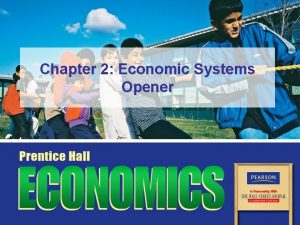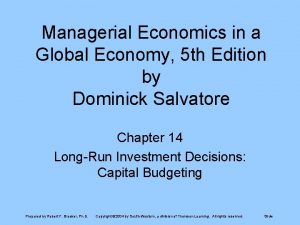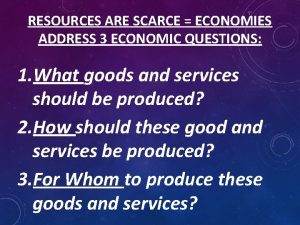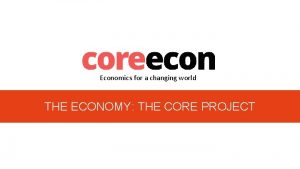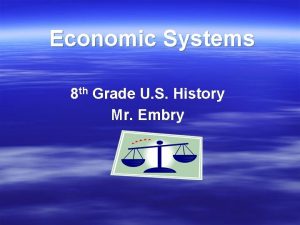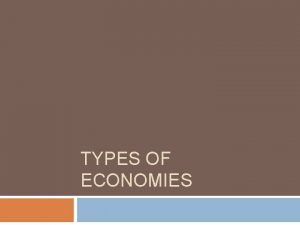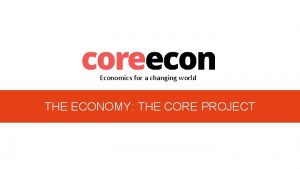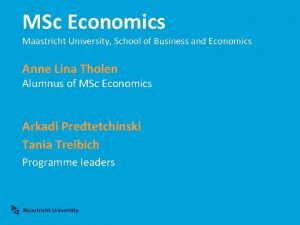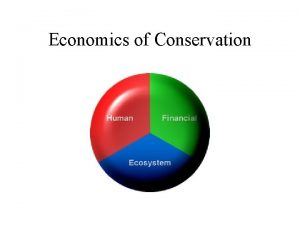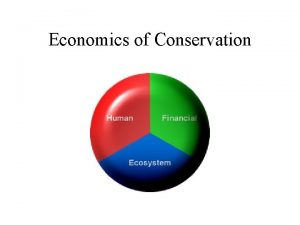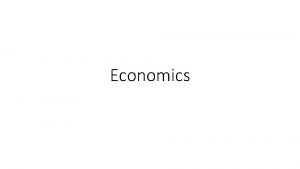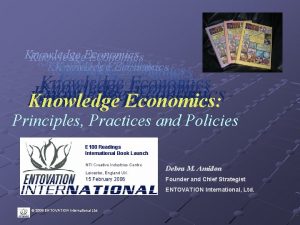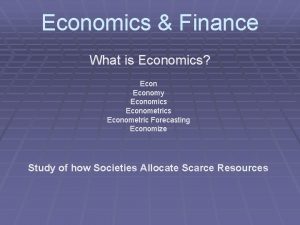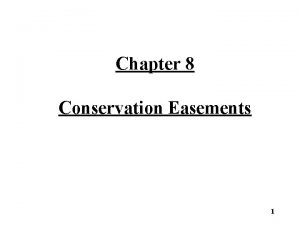Conservation Economics What is Economy An economy is









- Slides: 9

Conservation Economics What is Economy? An economy is a system of production, distribution and consumption of goods and services that satisfies people’s wants or needs. Economic resources: 4 kinds • Natural resources/capital • Human resources • Financial resources • Manufactured resources. Types of Economic systems Economic system 1. Market (Pure Free Market & Capitalist Market) 2. Command


Environmental Decline • Conventional economics underlies the assumption that an economy is a system that is essentially isolated form the natural world and only involves a circular exchange of goods and services between businesses and households. • Ignores the origin of natural resources flowing into the system and the fate of the wastes flowing out of the system. • Biodiversity is under serious threat from human activities that lead to land use, fragmentation, harvesting, hunting, pollution and climate change. • With continued economic growth, it is likely that the pressure on current biodiversity will increase. • Depletion of resources and discharge of waste into the biosphere. GNI (Gross National Income) and GDP (Gross Domestic Product) 1. GNI and GDP hide the harmful environmental and social effects of producing goods and services. 2. GNI and GDP does not include the depletion and degradation of natural resources. 3. GNI and GDP hide the enormous waste of natural and human resources because they measure only money spent. 4. GNI and GDP does not tell anything about income distribution and economic justice.


Ecological Economics • Ecological economics is a transdisciplinary field that aims to improve and expand economic theory to integrate the earth’s natural systems, human values and human health and well-being. • Consider the earth’s natural resources vital because they support all life and economic systems. • Believe conventional economic growth as unsustainable. • Integrates Ecology with Economics. Capitals in Ecological Economics Built: Buildings, cars, infrastructure created by human industry. Social: Interactions with others (friends, family) and structure of society (language, institution, laws). Natural: Goods and services provided by nature. Human: Sum of our own health, personal experiences, education, talents, skills and interests.



Ecological Economics And Biodiversity Conservation Biodiversity as the underpinning foundation of ecological economics as it provides the ecosystem services and resources upon which economic activity depends. Biodiversity can provide economic benefits and conservation should be viewed as an area of economic opportunity, and not as a constraint.

Ecological Economics And Biodiversity Conservation Ecological economics doesn't sees biodiversity conservation as a cost but rather as an opportunity. • To increase the profits from various economic activities. • To mitigate risks and decrease costs due to degraded ecosystems. • As well as to develop new products taking advantage of the benefits provided by nature in a sustainable manner.
 Athens vs sparta differences
Athens vs sparta differences Economics mixed economy
Economics mixed economy Managerial economics in a global economy
Managerial economics in a global economy Traditional economy definition economics
Traditional economy definition economics The economy: economics for a changing world
The economy: economics for a changing world Traditional economy definition economics
Traditional economy definition economics Traditional economy definition economics
Traditional economy definition economics Three types of economics
Three types of economics The economy: economics for a changing world
The economy: economics for a changing world Economics and business economics maastricht
Economics and business economics maastricht

